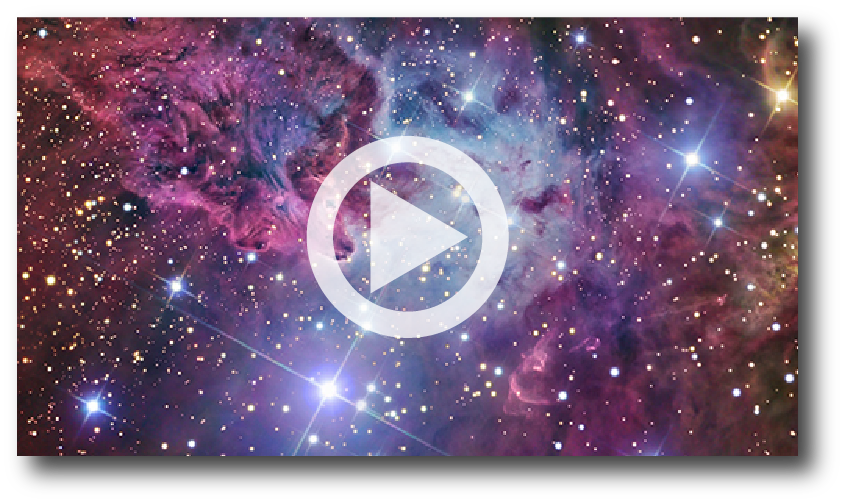"Do Black Holes Create New Universes?" A PBS Time Space Video
Download Adobe.pdf of this Essay • HOME
For this video, I have two main points I want to consider. The first, and I think the most important, is that this video proves there is a chance for Christianity and science to reach out to each other, and the time might be right to start making such a move publicly (I don't think at the personal level, there is really much problem here; it's society's views as a whole I speak of). The second is something I think very few others will even notice: a recognition of the fundamental flaw modern day atheists have in their philosophies.
I don't know that it is necessary to watch the whole video to see the first point. If one pays attention to the first few minutes, one will see that science is essentially admitting that our universe is too organized for it to be credibly attributed to chance. Here is a clear and obvious introduction to the Christian idea of God as creator.
If you move on a bit longer, however, you will see the host, Matt O'Dowd, talk about having a theory that can be "testable." This is because the traditional dividing line between science and non-science (religion in particular) was drawn by Karl Popper's Falsifiability Criteria. It holds that, for a theory to be scientific, it must be testable in such a way that it could fail. A classic example is, "All swans are white." This is scientific because swans can be tested for color, and such a test could fail if a non-white swan was found (and there is a black swan that is native to Australia, cygnus atratus).
Without using these words, this video admits to a very real problem skeptics have in explaining how our universe could be created without God. In fact, it borders on a paradox. Almost any theory scientists could be able to come up with on how the universe was created would not be scientific because of the inability to test it. The one "testable" theory claimed in the video was proven wrong! And even if a testable theory could be found, it would have very little credibility because of the inherent limits of such a test. One would have to step outside the universe to have any meaningful perspective on the matter. As C.S. Lewis pointed out, milk that is spilled out on the ground is proof that milk was once in a container, but the pattern of the spill gives no indication on what shape that container might have been.
This test would be analogous to the till of a cashier at a store that had $100 at the beginning of the shift, and $500 at the end. A theory could be made that $400 in sales must have taken place, and the test of $100 + $400 does indeed equal $500. But anyone who manages a store will see how weak this theory really is, even if it passed the test. For example, this theory does not include returns, or credit/debit card transactions. One has to look at all monetary aspects of the store to know its sales, not just the till. Furthermore, other additions and subtractions can (even if only rarely) take place: theft, miscounting change, etc.
In short, for science to solve the mystery of why the universe is so perfect for life, it will need to become a religion itself. And, fortunately for them, Christianity is already available.
I could speak much about the philosophical aspects of this video, but I will try to keep it short. The classical atheists (Karl Marx, Sigmund Freud, Freidrich Neitzsche ... all the way up to Albert Camus and Jean-Paul Sartre) all lived in a time when belief that the universe always was and always will be (what I call classical materialism) was accepted as a priori. Albert Einstein's theories quickly paved the way to discover that the universe was not infinitely old, nor would it exist as a dynamic entity forever. So, why is this important?
The classical atheists, by assuming that evolution had an infinite time to work, had no problem with the universe being "too perfect for life," as the right combination of molecules would eventually come together (although what might keep mixing up the universe so it didn't solidify into one colossal clump was never seriously addressed). Therefore, the need for God the creator to not only create but to design the universe was not needed. I disagree with their thoughts on the matter, but since science has refuted this possibility there is no need to go off on this tangent. But unlike mainstream science, which could remove this aspect of classical materialism with little or no impact on their theories, the fundamental premise necessary for classical atheism has been proven wrong.
Modern atheists, however, do not seem to be interested in what their philosophical forefathers thought. While the classical atheists were true enemies of religion, they still respected religion and took it seriously. Generally, classical atheists assumed that religion's evolutionary purpose was to create a morality that more enlightened people could enjoy without the "shackles" of religion. A few were even realistic in wondering how long morality could survive without religion, even while they continued to promote the theory of atheism. Nietzsche, for example, looked to nihilism, while Sartre actually admitted that God was a "necessary absurdity" (and, at the end of his life, changed his mind and became a Messianic Jew).
Instead, modern atheists are not characterized as being philosophical. They are skeptical at best and emotional at worst in their beliefs. Perhaps God is working to undermine atheism through the very science so many atheists hold so dear, and perhaps He is calling us to help science down the right path.
Original Publication Date: 9 September 2020
